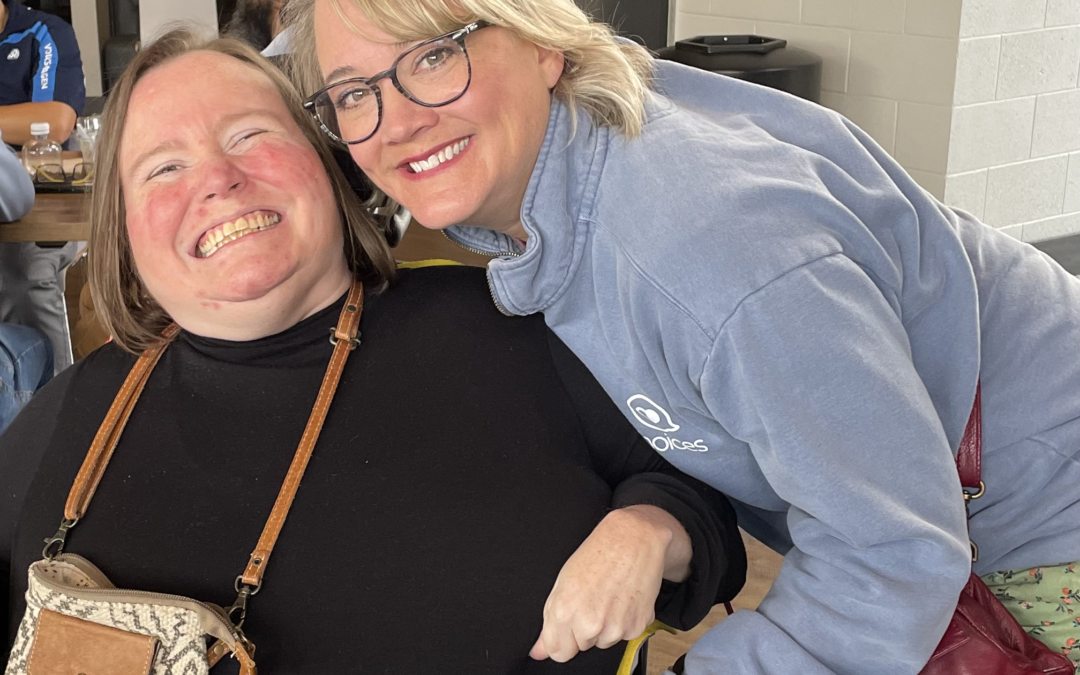God’s sanctifying work often happens through suffering and does not always feel loving. As mentioned in the previous posts about the heart and the brain, seeking a true reality of self is instrumental in our ability to adjust our perspective. This adjustment allows for literal healing of the neurons in our brains. Neurological healing provides the sufferer a more accurate idea of who God is and how deeply his love reaches.
If There Ever Was a Dorothy
Every Tuesday I volunteer at Choices Pregnancy Care Center. A few months ago, I was super lucky and had the privilege of scribing for my fellow volunteer named TJ. I walked the patient into the room where TJ was already positioned in her chair wearing her sweet smile. She began the intake with her standard explanatory greeting. “Hi I’m TJ and I have cerebral palsy, a condition that affects me physically but has no affect on my mental or emotional ability.” She worked her way through the intake and I diligently wrote down the patient’s answers. As the patient described her concerns about bringing a baby into her life during less than ideal circumstances she looked up at me then at TJ then timidly looked down at the floor. TJ’s compassionate genuine heart overflowed. She responded, “Wow, that sounds really hard. I am so sorry for all you are having to go through right now.”
When you spend time with TJ the superficial aspects of life fall away. She roams through life in her motorized chair, needing constant care, the embodiment of what most of us would call suffering. And you realize, at her core, she is propped up and carried by a loving Savior that fills her with joy. A joy that is palpable in her humor and her smile and her love for others.
Be Courageous
Job’s story foreshadowing Christ exemplifies for us God’s use of our suffering. Despite the devastation around him and within him Job clings to the truth he knows in his heart but is imperceptible in his current time and place. Job is not only asking for relief, but he is faithfully expectant. He seeks answers to gain internal peace and transformation through the understanding of his suffering.
The Personification come to earth in the flesh is no stranger to Job’s suffering. Jesus is familiar with every type of suffering that comes with this life. We can read about the extreme depth of Christ’s physical suffering as he wanders the desert, strains in prayer to the point of bleeding in Gethsemane and is tortured on the cross. He experiences emotional suffering after teaching rich truth in love and then is threatened to be tossed over a cliff (Luke 4:29). Peter writes how Christ responded to being reviled and endured false condemnation without threatening his revilers (1 Peter 1:22-23). Beyond anything we can imagine is the moment the temple curtain is torn in two. The perfect Savior voices utter despair as God turns His face away (Matthew 27:51).
Link Arms and Skip Along
It sounds counterintuitive, but his allowance for our suffering is one of the greatest provisions of God’s love. As TJ’s presence embodies suffering she also rolls through the hallways of Choices flooding each of our hearts with the reflection of God’s goodness. Without even knowing it, TJ is a constant reminder how suffering holds value. It draws us closer to God and gives us a deeper understanding of all he is. It also demands a deeper closeness with others that mirrors the love of the Lord resulting in His perfect agenda. Without having experienced suffering, a believer lacks rich goodness which necessitates empathy allowing others the opportunity to love with Christ’s sacrificial love.
Our perspective is important. How we view our lives and our relationships determines how we respond to the emotions brought on by our suffering. Dr. Thompson explains in his book The Soul of Desire that our lament is due to our desperate longing for beauty. We have ingrained in our hearts and minds this longing as inspiration drives us toward action.
Understanding the existence of suffering is one thing. Having courage that allows others to sit with us in our suffering demands a tremendous amount of nerve. Sharing in the suffering of others forms a connection created from the necessity of support and understanding. We see mirrored in each other the depth of God’s unshakeable love for us. The relational connection developed through sharing our suffering is vital for kingdom work throughout a lifetime of sanctification.
References
English Standard Version, Bible. (2012/1952). ESV Single Column Journaling Bible (Black). Crossway.
Fortin, J. (2021). At pains following and serving God: A contemporary theology of joy in suffering. Heythrop Journal, 62(3), 574-585. https://doi.org/10.1111/heyj.13317
Fortin, J. (2018). Lament of a wounded priest: The spiritual journey of job. Religions (Basel, Switzerland), 9(12), 417-14 pp. https://doi.org/10.3390/rel9120417
Kanov, J. (2021). Why suffering matters. Journal of Management Inquiry, 30(1), 85-90. https://doi.org/10.1177/1056492620929766
Thompson, C. (2010). Anatomy of the soul: Surprising connections between neuroscience and spiritual practices that can transform your life and relationships. Tyndale House Publishers, Inc.
Thompson, C. (2021). The soul of desire: Discovering the neuroscience of longing, beauty, and community. InterVarsity Press.
Van der Kolk, B. (2014). The body keeps the score: Brain, mind, and body in the healing of trauma. Penguin Books


Recent Comments